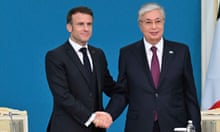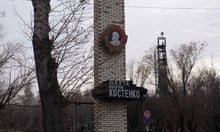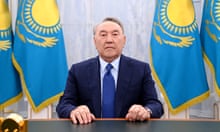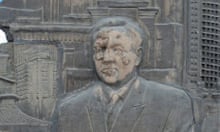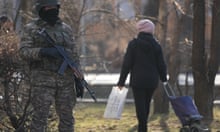Authorities in Kazakhstan have said 164 people were killed in the unrest that rocked the country in the past week, including three children. The health ministry said 103 of the deaths were in Almaty, the country’s largest city and the centre of the violence.
After the worst violence in independent Kazakhstan’s 30-year history, the situation in Almaty and other cities was largely calm on Sunday. Authorities said they had recovered control and life would slowly get back to normal in the coming days. In Almaty, authorities announced that some public transport would resume on Monday.
However, the deputy defence minister, Sultan Gamaletdinov, said on Sunday that a “counterterrorist operation” was still under way and would continue “until the terrorists are completely eliminated and the constitutional order is restored in the republic of Kazakhstan”.
The number of people detained by police continues to rise, with police giving an updated figure of 6,044. The president’s office said law enforcement agencies had seized back control of administrative buildings, with Russian-led troops guarding key facilities.
There was fresh international condemnation of the government’s handling of the crisis on Sunday, as France said that European foreign ministers would this week consider possible measures in response to the crackdown. “[They will discuss] measures which Europe could take to send a message: that you cannot crush a people, protesters, rebelling against the cost of living,” the French European affairs minister, Clément Beaune, told CNEWS.
The US secretary of state, meanwhile, criticised the shoot-to-kill order that President Kassym-Jomart Tokayev said he had issued. “That is something that I absolutely reject. The shoot-to-kill order, to the extent it exists, is wrong and should be rescinded,” Antony Blinken told ABC. “We have real concerns about the state of emergency that was declared.”
The protests began last Sunday in the west of the country over a steep rise in fuel prices, and quickly spread to Almaty and other cities, driven by years of pent-up frustration. On Wednesday, violent clashes began, and groups of men seized the airport and stormed government buildings. Many on the ground reported that violent organised groups seemed to have taken over the protest.
Tokayev fired two more top security officials on Sunday, stepping up a purge of the country’s security agency. The sacked officials, Marat Osipov and Daulet Ergozhin, were deputies to former intelligence chief Karim Massimov, a two-time prime minister who has been arrested on suspicion of treason.
The president’s website gave no explanation of the sackings in a terse statement late on Sunday.
On Friday, Tokayev gave a hardline address in which he said he had ordered law enforcement bodies to shoot to kill without warning, and said Almaty had been attacked by a group of 20,000 “bandits and terrorists”.
Erzhan Kazykhan, a presidential adviser, made a video address in English on Sunday, accusing some in the west of misinterpreting events. “Regretfully, peaceful demonstrations in Almaty and some other regions were hijacked by perpetrators and both local and external terrorist groups speaking foreign languages,” he said.
Authorities have not yet released any evidence proving the involvement of either “terrorists” or foreign forces. On Sunday, local television showed a video confession of a bruised man, who said he had been paid to travel from neighbouring Kyrgyzstan and take part in violence. However, viewers in Kyrgyzstan quickly identified him as a well-known jazz musician who frequently toured Kazakhstan, and expressed doubts that he could have been a rioter.
Reports of possible infighting within the Kazakhstani elites driving part of the violence appear to be more plausible. Karim Masimov, the head of the security services and a former prime minister, was first removed from office and then arrested during the week on suspicion of treason. No details have been released of what Masimov is alleged to have done.
Some sources have pointed to recent disagreements between Tokayev and figures close to his predecessor, Nursultan Nazarbayev, who ruled the country from independence in 1991 until 2019 and handpicked Tokayev as his successor. Nazarbayev holds the honorific title of leader of the nation, and the country’s capital was renamed Nur-Sultan in his honour in 2019. He was removed by Tokayev as head of the National Security Council this week.
Many of the protesters chanted, “Old man, out!” in reference to Nazarbayev, while in the city of Taldykorgan, a statue of him was pulled down. Anger has focused on the considerable wealth amassed by his family and his continuing influence over the political scene.
Nazarbayev’s press secretary has claimed the previous president is in the country and is backing Tokayev, but Nazarbayev has not spoken or appeared in public since the unrest began.
Former prime minister Akezhan Kazhegeldin said Tokayev needed to dispel doubts about who was really in charge. “I think a lot of people in social networks, critics, continue to say he’s a nominee of Nazarbayev, that Nazarbayev is standing behind his back and manipulating him,” he said.
“Now he has complete formal executive power, the question is how he will deploy it. He needs to take command.”
On Wednesday, Tokayev called on a Russia-led military alliance, the Collective Security Treaty Organization (CSTO), to send troops into the country. This was agreed in a matter of hours, and a force reportedly numbering about 2,500 mostly Russian troops is now on the ground. Tokayev, Russia’s president, Vladimir Putin, and the leaders of the other CSTO nations – Belarus, Kyrgyzstan, Armenia and Tajikistan – are due to hold a video conference on Monday.
Tokayev was likely to name new government members when he addressed parliament on Tuesday, his spokesman said.
Reuters contributed to this report


